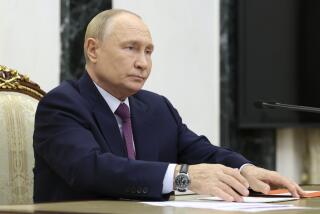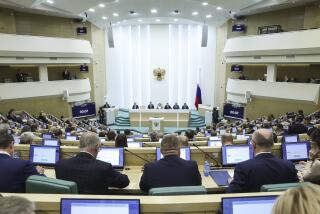Soviets Seek 1-Kiloton Limit on A-Tests
- Share via
GENEVA — The Soviet Union on Tuesday proposed drastic limitations on Soviet and U.S. nuclear weapons tests in what it said was a move to break a deadlock in U.S.-Soviet talks on testing issues.
The proposal would lower the present agreed maximum yield of 150 kilotons to one kiloton.
Meanwhile, in Moscow, a Foreign Ministry spokesman said Tuesday that a draft U.S.-Soviet arms treaty may be ready by September or October, to be followed immediately by a superpower summit in Washington.
Spokesman Boris Pyadyshev said the timing of the third meeting between Soviet leader Mikhail S. Gorbachev and President Reagan depends on arms talks in Geneva.
“The two delegations can finalize the appropriate draft in Geneva approximately in September or October,” Pyadyshev told a news conference.
“If the two delegations at Geneva succeed in fulfilling this time frame, then a summit might take place at any moment after that deadline--that is starting from November.”
Pyadyshev said Foreign Minister Eduard A. Shevardnadze may have to meet with Secretary of State George P. Shultz in Washington “in the not too distant future” to discuss the summit.
“Is it realistic to expect a meeting of the leaders of the two powers?” Pyadyshev asked rhetorically. “In our view it is--and even this year at that.”
In Geneva, Deputy Foreign Minister Vladimir F. Petrovsky announced the Soviet testing plan as the 40-nation Geneva Conference on Disarmament opened its summer session.
He also offered a draft document listing key provisions of a comprehensive test ban treaty, including measures to prevent cheating. He said that in its initial stage, only the two superpowers should be bound by the treaty.
Petrovsky described the U.S.-Soviet talks as “stalled.” He said Moscow still prefers a freeze on all underground nuclear tests--the only type permitted since 1963--but “taking into consideration the U.S. position, we would be ready to agree to limit the yield of nuclear explosions to one kiloton and reduce their number to a minimum.”
He said this could be done through legislation in both countries.
There was no immediate response from the U.S. delegation.
Bilateral testing talks opened last July. A fifth round of discussions ended May 29, still without agreement on an agenda for formal negotiations.
Petrovsky said the Soviet draft for a comprehensive treaty includes large-scale verification measures, ranging from an international network of seismic monitors to mandatory, international on-site inspections.
He said that negotiations on a ban on the use, production and stockpiling of chemical weapons have entered the “home stretch.”
More to Read
Sign up for Essential California
The most important California stories and recommendations in your inbox every morning.
You may occasionally receive promotional content from the Los Angeles Times.













